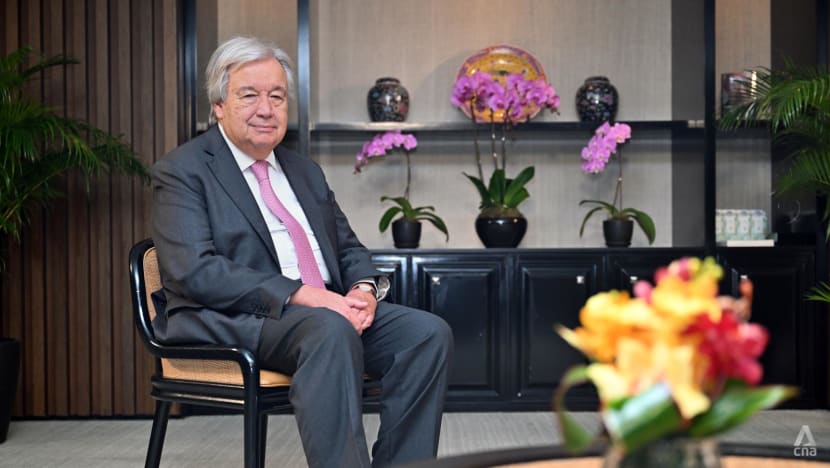UN chief calls for stronger political will to avoid ‘hell on earth’ climate situation
In an exclusive interview with CNA’s Climate Conversations podcast co-host Liling Tan, UN chief Antonio Guterres said global action on climate change now will save the planet from widespread destruction.
SINGAPORE: Governments must have stronger political will to take action on climate change and avoid a “hell on earth” situation, said United Nations Secretary-General Antonio Guterres on Monday (Sep 2).
He had earlier warned that the world has moved past global warming and entered an era of “global boiling”.
While there have been “a lot of changes” to tackle the trend, it is not enough, Guterres told CNA during a three-day official visit to Singapore.
“The question is not the instruments available (or the) science available,” he said, highlighting various promising developments from a massive expansion of renewable energy to advances in climate science.
“The only thing we need is the political will to use the instruments we already have to make sure that we reverse the present trends … that would lead to hell on earth,” he added.
Guterres stressed the need to limit global warming to 1.5 degrees Celsius above the pre-industrial average under the Paris Agreement to avert the worst effects of climate change.
“That means that we need to reverse the present trends in which emissions are still growing,” he said.
According to scientists, breaching that threshold would trigger catastrophic and irreversible impacts, from melting ice sheets to the collapse of ocean currents.
Guterres called on countries, particularly those in the Group of 20, to “start drastically reducing emissions”.
G20 nations are responsible for 80 per cent of planet-heating emissions, he added, referring to a forum for international economic cooperation among the world’s largest economies.
“It’s time to start the process to phase out fossil fuels. And it’s time to understand that we need to rescue our planet,” said Guterres, urging countries and businesses to do their part.
“If temperatures rise by 2, 3 or 4 degrees, we will witness the destruction of large parts of human life conditions, in different areas of the world.”
This comes as the rate of sea level increase over the past 3,000 years has been “unprecedented”, he said.
The Greenland and Antarctic ice sheets, which hold almost all of the world’s freshwater ice, are melting rapidly, and this could be made worse if the global average temperature rises.
“The consequences for coastal areas would be devastating,” said Guterres.
“(Cities by the sea are also) threatened if we do not avoid those tipping points, and if we do not avoid a dramatic acceleration of sea level rise in the next few years and decades.”

ASEAN HAS MORAL AUTHORITY TO END CLIMATE GRIDLOCK
During the interview, Guterres said he is “terribly worried” about the extreme weather conditions experienced by Southeast Asia, one of the regions most vulnerable to climate change.
Southeast Asia is prone to rising sea levels, heatwaves, floods and droughts.
Guterres had previously called on the Association of Southeast Asian Nations (ASEAN) to help end the global climate gridlock, saying it has a “moral authority” to do so.
“This is one of the areas that will be more dramatically impacted by climate change, and it’s not an area that is contributing decisively to climate change,” he said.
“This region has a huge moral authority to tell the polluters to stop.”
Highlighting how Singapore in particular plays a key role in the UN, he said the nation has been “decisive in our climate campaign” and is “one of the most active countries” in the global body.
“Singapore was decisive in the reforms that we have been able to introduce,” he noted.
The country has been able to mobilise countries to make the UN “a strong instrument to protect the planet, and to create more equity and justice in relations among countries and among people”, added Guterres.







